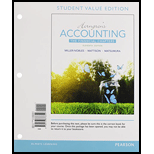
Concept Introduction:
TQM:
TQM stands for total quality management. TQM focuses on the overall quality of the product. It focuses on providing high product to the customers with the least defect possible. So that the confidence of the customers over the company and the product can be gained, that will overall benefit the business.
E-Commerce:
E-Commerce can be defined as the business done through internet i.e. goods are purchased and sold, services are provided through internet all over the world.
Triple Bottom Line:
Triple Bottom Line can be defined as the concept which focuses on including social and environmental factors to be considered along with the economic factors of the business, thus, it is termed as triple bottom line.
ERP (Enterprise Resource Planning):
ERPs are the software programmes designed as per the needs and the requirements of the business. It can be defined as a programme that combines all the operational activities and coordinate all of them together.
JIT (Just In Time):
JIT can be defined as the concept which focuses on the keeping only required amount of inventory as per the current demand.
To match:
Definitions:
1. A philosophy designed to integrate all organizational areas in order to provide customers with superior products and services while meeting organizational objectives. Require improving quality and eliminating defects and waste.
2. Use of the internet for business functions such as sales and customers service. Enables companies to reach customers around the world.
3. Evaluating a company’s performance by its economic, social and environmental impact.
4. Software System that integrates all of a company’s functions, departments, and data into a single system.
5. A System in which a company produces products just when they are needed to satisfy needs. Suppliers deliver materials when they are needed to begin production, and finished units are completed at the right time for delivery to customers.
With terms:
a. ERP
b. JIT
c. E-commerce
d. TQM
e. Triple Bottom Line.
Want to see the full answer?
Check out a sample textbook solution
Chapter 18 Solutions
Horngren's Accounting, The Financial Chapters, Student Value Edition Plus MyLab Accounting with Pearson eText -- Access Card Package (11th Edition)
- provide balance sheet?arrow_forwardAccounts receivable balance: 420000arrow_forwardBaxter Sports Ltd. of Australia manufactures sporting equipment. One of the company's products, a rugby helmet for the European market, requires a special plastic. During the quarter ending September 30, the company manufactured 3,500 helmets, using 2,350 kilograms of plastic. The plastic cost the company $19,975. According to the standard cost card, each helmet should require 0.65 kilograms of plastic, at a cost of $8.25 per kilogram. According to the standards, what cost for plastic should have been incurred to make 3,500 helmets? How much greater or less is this than the cost that was incurred?arrow_forward

 AccountingAccountingISBN:9781337272094Author:WARREN, Carl S., Reeve, James M., Duchac, Jonathan E.Publisher:Cengage Learning,
AccountingAccountingISBN:9781337272094Author:WARREN, Carl S., Reeve, James M., Duchac, Jonathan E.Publisher:Cengage Learning, Accounting Information SystemsAccountingISBN:9781337619202Author:Hall, James A.Publisher:Cengage Learning,
Accounting Information SystemsAccountingISBN:9781337619202Author:Hall, James A.Publisher:Cengage Learning, Horngren's Cost Accounting: A Managerial Emphasis...AccountingISBN:9780134475585Author:Srikant M. Datar, Madhav V. RajanPublisher:PEARSON
Horngren's Cost Accounting: A Managerial Emphasis...AccountingISBN:9780134475585Author:Srikant M. Datar, Madhav V. RajanPublisher:PEARSON Intermediate AccountingAccountingISBN:9781259722660Author:J. David Spiceland, Mark W. Nelson, Wayne M ThomasPublisher:McGraw-Hill Education
Intermediate AccountingAccountingISBN:9781259722660Author:J. David Spiceland, Mark W. Nelson, Wayne M ThomasPublisher:McGraw-Hill Education Financial and Managerial AccountingAccountingISBN:9781259726705Author:John J Wild, Ken W. Shaw, Barbara Chiappetta Fundamental Accounting PrinciplesPublisher:McGraw-Hill Education
Financial and Managerial AccountingAccountingISBN:9781259726705Author:John J Wild, Ken W. Shaw, Barbara Chiappetta Fundamental Accounting PrinciplesPublisher:McGraw-Hill Education





